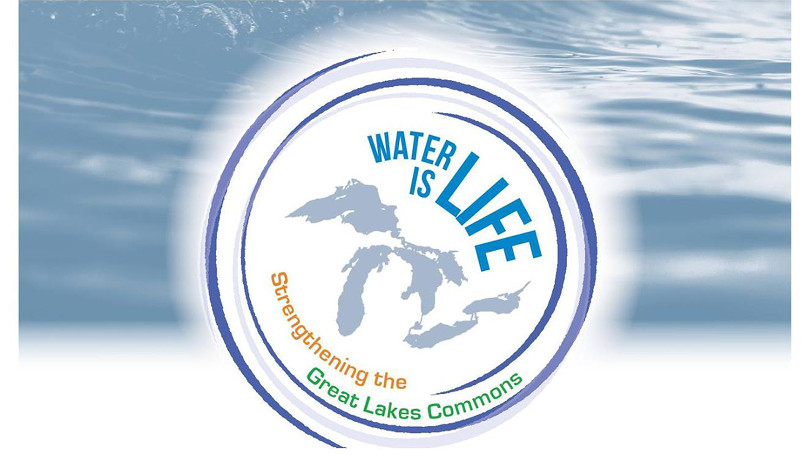Great Lakes water protector groups united at the Water Is Life: Strengthening the Great Lakes Commons conference in Flint on September 29- 30, 2017.
Water protection organizations representing urban and rural communities from Michigan and Ontario along with local residents, Indigenous representatives and activists attended this unprecedented international summit on water justice around the Great Lakes. Attendees pledged to challenge Nestlé and end the water crises in Flint, Detroit and Indigenous nations.
Maude Barlow of Council of Canadians presented the keynote speech on Friday evening to a crowd of more than 200 people at Woodside Church in Flint.
“The summit this weekend was a powerful moment for water justice organizations, Great Lakes residents and Indigenous representatives. We came together to challenge the issues that our governments are failing to address. We renewed our commitment and outlined concrete steps to secure the human right to water and bring about water and social justice for all communities around the Great Lakes,” Maude Barlow said.
People shared stories of violations of the human right to water. Water in communities around the Great Lakes is being put at risk by privatization and commodification.
A theme raised during the two-day summit was the outrage people feel at allowing Nestle to take water (essentially free) for private corporative profit while Flint, Detroit, and Indigenous communities cannot rely on public systems/government for clean water and many are shut off altogether. Sylvia Plain, from Aamjiwnaang First Nations, near Sarnia, expressed her concern that Indigenous nations in both countries have kept their treaty promises yet are still waiting for American and Canadian governments to reciprocate.
Claire McClinton of Democracy Defense League of Flint, Michigan said:
“In Flint Michigan, you can buy a gallon of lead free gas, or a gallon of lead free paint, but you can’t get a gallon of lead free water from your own tap”.
MCWC members who attended the Summit were committed to connecting the dots between Nestle’s push for corporate water by “taking” as much as possible while destroying the ecosystem of the Muskegon River Watershed. Meanwhile the folks in Flint and Detroit pay the highest prices for water in our country. Nestle makes $millions while the local communities are losing their precious water and gaining little economic value for the community.
In both the U.S. and Canada Nestlé controls access to underground aquifers, takes water for fractions of a penny per gallon and sells water marked up by 2000% in single use plastic bottles, which end up as litter rather than being recycled. The pumping, packaging and distribution of bottled water is unsustainable for the environment and carries a heavy carbon footprint. Bottled water undermines confidence in public tap water as governments neglect investment in public water infrastructure.
At the Summit’s conclusion, representatives of the water protection organizations, pledged to work together to protect water in their communities. They are continuing their work together and as the Water is Life Summit.
Michigan Citizens for Water Protection will call on Governor Snyder and our legislators to phase out permits to bottle water, and will defend the Osceola Township’s decision to say NO to the Nestle booster station zoning ordinance request. MCWC has begun a campaign to BOYCOTT products from Nestle, the Swiss company. MCWC will encourage members and supporters to contribute to the legal defense fund set up to cover the bills for the frivolous lawsuit Nestle filed against Osceola Township. Please click Nestlé Water Taking for more information.
We must remember that our water resources are cherished, valuable, and Water IS indeed the essence of all LIFE.


November 28, 2017 at 9:13 pm
Having read this I believed it was very enlightening. I appreciate you finding the time and energy to put
this article together. I once again find myself spending a
lot of time both reading and posting comments.
But so what, it was still worthwhile!
November 30, 2017 at 6:07 pm
Thanks so much for reading. 🙂 You’re right! It is worthwhile being informed and engaging in threats to our access to pure water. Have you seen our posts on Facebook?